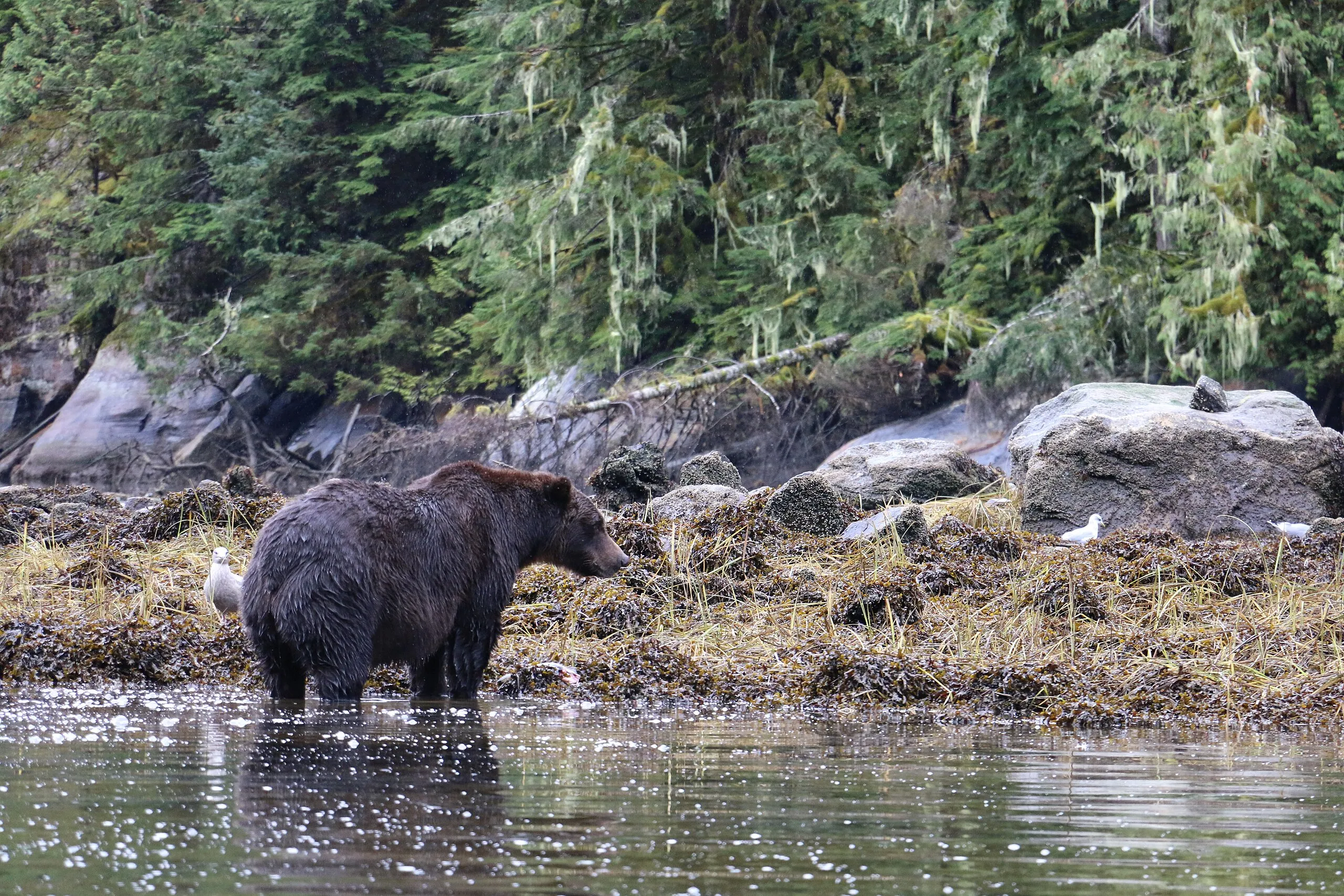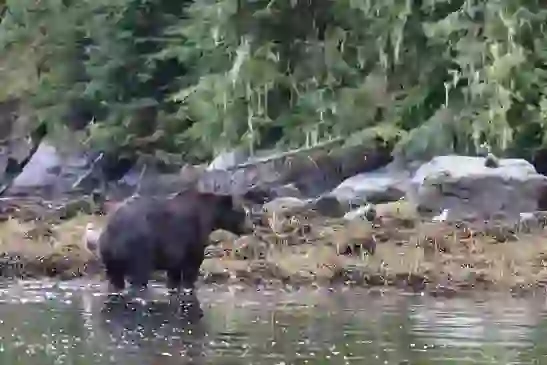
Stikine Brown Bear
Stikine Brown Bear
Stikine Brown Bear
In the Stikine River basin of British Columbia, Canada, where dense forests and rugged mountains meet, the Stikine brown bear makes its home. These bears, known for their powerful physique, play a vital role in the rich ecosystem of this region. Let's explore the world of the Stikine brown bear, their way of life, and the challenges they face for their future.
Stikine Brown Bear Basic Infomation

| Property | Value |
|---|---|
| Scientific Name | Ursus arctos stikensis |
| Taxonomic Status | SUBSPECIES |
| Rank | SPECIES |
| Vernacular Names | Stikine grizzly bear |
| Kingdom | Animalia |
| Phylum | Chordata |
| Class | Mammalia |
| Order | Carnivora |
| Family | Ursidae |
| Genus | Ursus |
| Habitats | Stikine River basin, British Columbia, Canada |
| Conservation Status | Least Concern (IUCN 2023) |

Size
They are 8.2 to 9.8 feet (2.5 to 3 meters) long, with males weighing around 660 to 990 pounds (300 to 450 kilograms). Females are slightly smaller but still have a very powerful physique.

Lifespan
They live for about 20 to 25 years in the wild, and can live up to 30 years or more in captivity.

Distribution
They are found in the Stikine River basin of British Columbia, Canada. The Stikine River is the fifth longest river in Canada, flowing for about 335 miles (539 kilometers).
They inhabit the mountainous and forested areas of this basin, and are particularly abundant along rivers with rich salmon runs.
Stikine Brown Bear Q&A

What kind of bear is the Stikine brown bear?
The Stikine brown bear is a subspecies of the brown bear found in the Stikine River basin of British Columbia, Canada.
They are sometimes called 'grizzly bears,' a term often used to refer to brown bears that live inland. The Stikine brown bear is closely related to the Alaskan grizzly bear and the Dall's brown bear, but it is slightly smaller. Stikine brown bears have dark brown or almost black fur. They may also have silver-tipped fur on their back and shoulders, which is where the name 'grizzly' (meaning 'grayish' in English) comes from. They are known for their large size and strength. Males can reach close to 10 feet (3 meters) in length and weigh over 990 pounds (450 kilograms), while females can exceed 6.5 feet (2 meters) in length. They are omnivores, eating salmon, fruits, plants, and sometimes even small mammals. They are also known to hibernate during the winter. During hibernation, they stay in dens dug in the ground until spring.

What do Stikine brown bears eat?
Stikine brown bears are omnivores, but they mainly eat fish, especially salmon.
During the summer salmon run, many Stikine brown bears gather along the river to catch salmon. They use their powerful claws to catch salmon and their sharp teeth to crush them. They can eat dozens of salmon in a single day! They also eat fruits, plants, insects, and small animals. In the fall, they eat a lot of nuts and animal-based foods to build up fat reserves for hibernation. They do not eat anything during hibernation.

[Quiz!] What kind of river is the Stikine River?
The Stikine River is a 335-mile-long (539 kilometers) river in British Columbia, Canada.
It originates in Glacier Bay National Park in Southeast Alaska, flows northwest through British Columbia, and empties into the Pacific Ocean near the border between Alaska and British Columbia. The Stikine River is famous for its salmon run. Every summer, many salmon swim up the Stikine River to spawn upstream. Stikine brown bears rely on these salmon as a primary food source. They wait on the river banks for jumping salmon and catch them with their powerful claws. They may also enter the river to chase salmon. The Stikine River is a vital life source for the Stikine brown bear.

[Quiz!] Is it true that female Stikine brown bears give birth during hibernation?
Yes, it's true! Female Stikine brown bears give birth to 1 to 3 cubs during hibernation.
The cubs are very small and hairless when they are born. They are kept warm by their mother's body heat and feed on her milk. They emerge from the den with their mother in the spring.

[Quiz!] Are Stikine brown bears dangerous to humans?
Stikine brown bears are very powerful animals and can attack humans.
However, they are generally afraid of humans and rarely attack proactively. If you encounter a Stikine brown bear, do not approach or provoke it, and quietly leave the area. When entering their habitat, be cautious and do not leave food unattended or litter, as these actions can attract bears to human settlements.

[Quiz!] Are Stikine brown bears endangered?
The Stikine brown bear is listed as 'Least Concern' on the IUCN (International Union for Conservation of Nature) Red List.
This means that they are not currently considered endangered. However, their population is declining and requires attention. Their habitat in the Stikine River basin, including forests and mountainous areas, is threatened by deforestation and development. To protect Stikine brown bears, it is important to conserve their habitat and promote coexistence with humans.

Would you like to become a part of the 'Animalbook.jp'?
Turn your knowledge into Q&A and share it with the world. ※Publication will be activated after purchase. Let's share information together!
Stikine Brown Bear Type of List

Characteristics of Stikine Brown Bears
- Subspecies of the brown bear
- Live in the Stikine River basin of British Columbia, Canada
- Dark brown or nearly black fur
- May have silver-tipped fur on their back and shoulders
- Large bear
- Omnivorous
- Hibernate
- Least Concern (LC)
Information
Congratulations! You are the first commenter!

Create Your Favorite List!
Stikine Brown Bear
Save the animals you love! Build your own list to quickly revisit your favorites later.

Would you like to leave a comment?
※Please note: This is for the purchase of rights to post comments within the article.
Find Your Favorites!
Our shop offers a unique and attractive selection of goods themed around various animals.
Stikine Brown Bear References
Stikine Brown Bear Introduction of media used

The Interior, CC BY-SA 4.0, via Wikimedia Commons

Help Enrich Our Animalbook.jp with Your Media!
We are constantly looking to expand and enrich our Animalbook.jp with amazing photos and videos of animals. If you have any media that you'd like to share, please contribute and help us showcase the beauty and diversity of the animal kingdom. Your submissions will be credited and featured in our encyclopedia, reaching a wide audience of animal lovers.


















